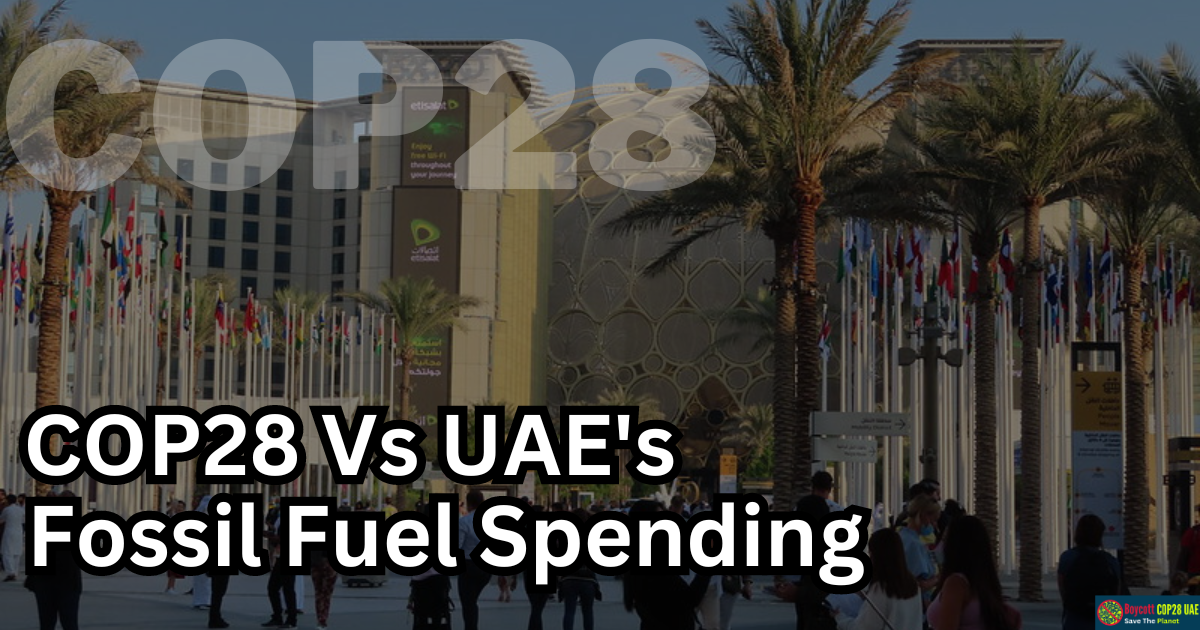In the lead-up to the highly anticipated COP28 climate summit set to take place in Dubai from November 30 to December 12, concerns are mounting over the United Arab Emirates’ (UAE) suitability as the host nation. This unease stems from revelations that the UAE’s oil giant, ADNOC (Abu Dhabi National Oil Company), headed by COP28’s President Sultan al-Jaber, is projected to allocate over $1 billion per month towards fossil fuel endeavors throughout the next decade.
According to a recent analysis conducted by the international NGO Global Witness, this substantial financial commitment to fossil fuels dwarfs ADNOC’s investments in decarbonization projects by nearly sevenfold over the same period.
ADNOC has recently made headlines by advancing its net-zero emissions target to 2045, a commendable move on the surface. However, Global Witness has disputed the company’s environmental aspirations, asserting that the assumptions made by ADNOC are inaccurate.
The discrepancy between ADNOC’s proclaimed climate goals and its substantial financial backing of fossil fuels has led to skepticism regarding the UAE’s hosting of COP28, a pivotal conference for addressing the global climate crisis.
Global Witness, sharing their analysis exclusively with CNBC, revealed that ADNOC’s plans involve an average monthly investment of $1.14 billion in oil and gas production alone until 2030. Remarkably, this is the same year the United Nations has set a target of reducing global emissions by 45% to avert a climate catastrophe.
Evidently, ADNOC’s expenditure on fossil fuels significantly overshadows its commitment to “low-carbon solution” projects during this critical decade.
Looking further ahead to 2050, the year by which the UN insists the entire global economy must achieve net-zero emissions, ADNOC is projected to have invested an astonishing $387 billion in oil and gas. This massive investment in fossil fuels underscores the urgency of addressing the climate emergency, driven primarily by the burning of fossil fuels.
ADNOC, however, has contested Global Witness’ analysis. A spokesperson for the company responded via email to CNBC, stating, “The analysis of, and assumptions made, regarding ADNOC’s capital expenditure program beyond the company’s current five-year business plan (2023 to 2027) are speculative and therefore incorrect.”
Earlier this year, the Abu Dhabi energy group announced a $15 billion allocation for investment in “low-carbon solutions” by 2030. This allocation includes investments in clean power, carbon capture and storage, and electrification projects. Global Witness derived its projections by examining ADNOC’s anticipated oil and gas capital expenditure, exploratory capital expenditure, and operational expenditure from 2023 to 2050. The data for this analysis was sourced from Rystad Energy’s UCube database.
While Rystad’s data is not publicly accessible, it is widely acknowledged and used by major oil and gas companies and international organizations.
Patrick Galey, senior investigator at Global Witness, criticized fossil fuel companies for their tendency to emphasize their green credentials while continuing to invest substantial sums in polluting oil and gas operations. He remarked, “Fossil fuels companies like to burnish their green credentials, yet they rarely say the quiet part out loud: that they continue to throw eye watering amounts at the same old polluting oil and gas that is accelerating the climate crisis.”
Galey further questioned the credibility of Sultan al-Jaber’s role as the President of COP28, given his position as the head of ADNOC, which appears to prioritize fossil fuels over renewable alternatives. “How [al-Jaber] can expect to lecture other nations on the need to decarbonize and be taken seriously is anyone’s guess, while he continues to provide vastly more funding to oil and gas than to renewable alternatives,” Galey added. “He is a fossil fuel boss, plain and simple, saying one thing while his company does the other.”
These revelations have ignited a debate about whether the UAE, with its prominent role in the fossil fuel industry, can credibly lead discussions on global climate action during COP28. Civil society groups, as well as lawmakers from the United States and the European Union, have expressed concerns about al-Jaber’s dual roles as COP28 president and ADNOC CEO.
However, some government ministers have come forward to defend his appointment, emphasizing the UAE’s commitment to transitioning towards a more sustainable energy future.
The juxtaposition of ADNOC’s significant financial backing of fossil fuels and its aspirations for sustainability raises fundamental questions about the credibility and effectiveness of COP28 as a platform for meaningful climate action. With the climate crisis intensifying, global leaders will gather in Dubai later this year to deliberate on solutions, but the controversy surrounding ADNOC’s dual role casts a shadow over the conference’s potential impact on addressing one of the world’s most pressing challenges.






